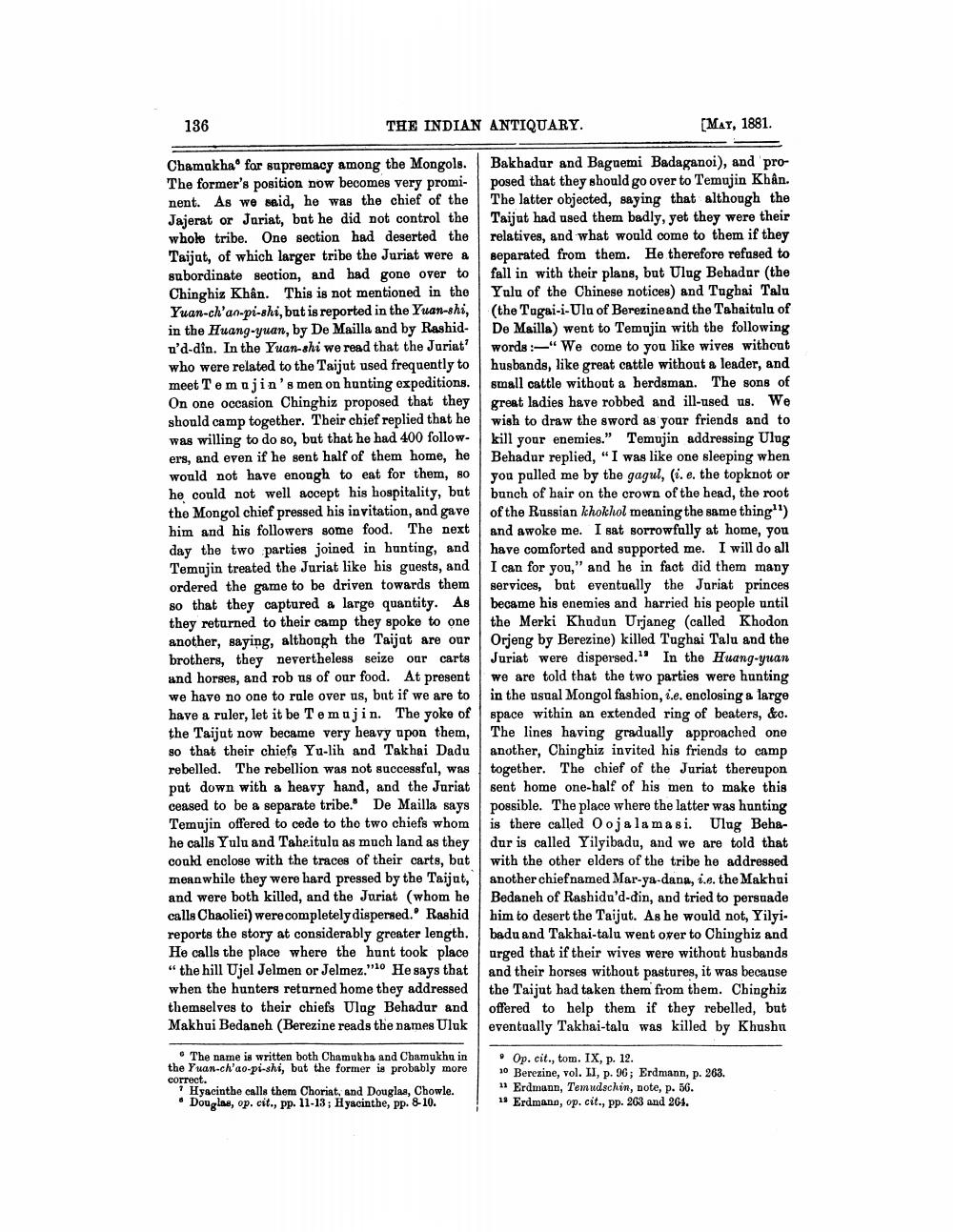________________
136
THE INDIAN ANTIQUARY.
Chamakha for supremacy among the Mongols. The former's position now becomes very prominent. As we said, he was the chief of the Jajerat or Juriat, but he did not control the whole tribe. One section had deserted the Taijut, of which larger tribe the Juriat were a subordinate section, and had gone over to Chinghiz Khân. This is not mentioned in the Yuan-ch'an-pi-shi, but is reported in the Yuan-shi, in the Huang-yuan, by De Mailla and by Rashidu'd-din. In the Yuan-shi we read that the Juriat' who were related to the Taijut used frequently to meet Temujin's men on hunting expeditions. On one occasion Chinghiz proposed that they should camp together. Their chief replied that he was willing to do so, but that he had 400 followers, and even if he sent half of them home, he would not have enough to eat for them, so he could not well accept his hospitality, but the Mongol chief pressed his invitation, and gave him and his followers some food. The next day the two parties joined in hunting, and Temujin treated the Juriat like his guests, and ordered the game to be driven towards them so that they captured a large quantity. As they returned to their camp they spoke to one another, saying, although the Taijut are our brothers, they nevertheless seize our carts and horses, and rob us of our food. At present we have no one to rule over us, but if we are to have a ruler, let it be Temujin. The yoke of the Taijut now became very heavy upon them, so that their chiefs Yu-lih and Takhai Dadu rebelled. The rebellion was not successful, was put down with a heavy hand, and the Juriat ceased to be a separate tribe. De Mailla says Temujin offered to cede to the two chiefs whom he calls Yulu and Taheitulu as much land as they could enclose with the traces of their carts, but meanwhile they were hard pressed by the Taijut, and were both killed, and the Juriat (whom he calls Chaoliei) were completely dispersed. Rashid reports the story at considerably greater length. He calls the place where the hunt took place "the hill Ujel Jelmen or Jelmez."10 He says that when the hunters returned home they addressed themselves to their chiefs Ulug Behadur and Makhui Bedaneh (Berezine reads the names Uluk
The name is written both Chamukha and Chamukhu in the Yuan-ch'ao-pi-shi, but the former is probably more correct.
Hyacinthe calls them Choriat, and Douglas, Chowle. Douglas, op. cit., pp. 11-13; Hyacinthe, pp. 8-10.
[MAY, 1881.
Bakhadur and Baguemi Badaganoi), and proposed that they should go over to Temujin Khân. The latter objected, saying that although the Taijut had used them badly, yet they were their relatives, and what would come to them if they separated from them. He therefore refused to fall in with their plans, but Ulug Behadur (the Yulu of the Chinese notices) and Tughai Talu (the Tugai-i-Ulu of Berezine and the Tahaitulu of De Mailla) went to Temujin with the following words:"We come to you like wives without husbands, like great cattle without a leader, and small cattle without a herdsman. The sons of great ladies have robbed and ill-used us. We wish to draw the sword as your friends and to kill your enemies." Temujin addressing Ulug Behadur replied, "I was like one sleeping when you pulled me by the gagul, (i. e. the topknot or bunch of hair on the crown of the head, the root of the Russian khokhol meaning the same thing11) and awoke me. I sat sorrowfully at home, you have comforted and supported me. I will do all I can for you," and he in fact did them many services, but eventually the Juriat princes became his enemies and harried his people until the Merki Khudun Urjaneg (called Khodon Orjeng by Berezine) killed Tughai Talu and the Juriat were dispersed." In the Huang-yuan we are told that the two parties were hunting in the usual Mongol fashion, i.e. enclosing a large space within an extended ring of beaters, &c. The lines having gradually approached one another, Chinghiz invited his friends to camp together. The chief of the Juriat thereupon sent home one-half of his men to make this possible. The place where the latter was hunting is there called Oojala masi. Ulug Behadur is called Yilyibadu, and we are told that with the other elders of the tribe he addressed another chiefnamed Mar-ya-dana, i.e. the Makhui Bedaneh of Rashida'd-din, and tried to persuade him to desert the Taijut. As he would not, Yilyibadu and Takhai-talu went over to Chinghiz and urged that if their wives were without husbands and their horses without pastures, it was because the Taijut had taken them from them. Chinghiz offered to help them if they rebelled, but eventually Takhai-talu was killed by Khushu
Op. cit., tom. IX, p. 12.
10 Berezine, vol. II, p. 96; Erdmann, p. 263.
11 Erdmann, Temudschin, note, p. 56.
13 Erdmann, op. cit., pp. 263 and 264.




